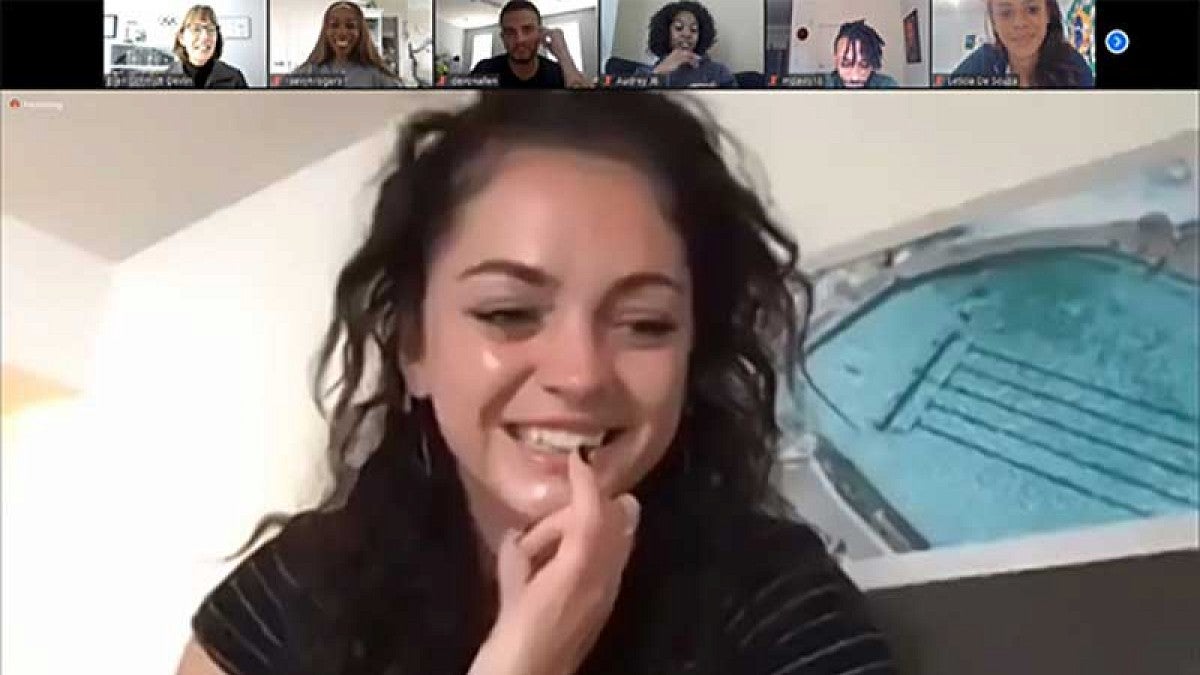In the early days of state-issued quarantines, faculty members at the Lundquist College of Business’s sports product management program wanted a way to bring people together and provide a pleasant diversion for people now primarily living their lives at home.
The program’s Jennie Leander and Matt Davis were bouncing around ideas and hatched a plan for a webcast of elite track athletes to discuss how the COVID-19 pandemic was affecting them, particularly in the wake of the announcement postponing the 2020 Tokyo summer Olympics that came days before.
“Whether you’re an athlete or a student at the UO, people are looking for connection, engagement, ways to connect and help one another,” said Leander, associate director of graduate affairs and student services. She and Davis, an academic and career advisor, reached out to athletes they were connected with and had immediate buy in.
They pitched it to Ellen Schmidt-Devlin, the program’s executive director, on Monday, who was all in on the plan.
“We wanted to do something that would pull us together as a U of O community,” Schmidt-Devlin said, “and we thought right away this is a perfect way to bring the academic side together with the athletic side and a world event.”
The panel included two names familiar to any Duck fan: Raevyn Rogers and Devon Allen, both track and field standouts during their times at Oregon. Fellow American Wil London, Australian Ella Nelson, Canadian Audrey Jean Baptiste and Brazilian Leti De Souza also joined the panel.
“When we realized we have six Olympians from across the world, we said holy moly, we can share this with other people, not just our students,” Leander said. “We’re all facing up to a new reality, and so are they.”
In less than two days, thanks to a monumental effort from several Lundquist faculty members and staff, particularly the IT department, everything was put in place. At noon, the world got a peek into the lives and homes of six athletes.
“We wanted to put something on in the middle of the day that people might tune into for just an hour and focus not on ‘How am I going to do my job from my house or teach my children’ and just connect with some individuals in a way that shows they’re struggling just like most of us are,” Leander said.
With Schmidt-Devlin moderating the panel, she asked the participants about their thoughts on the Olympics’ postponement and a range of other topics.
“We have to deal with this pandemic just like everyone else,” Rogers said. “Anybody can be affected, no matter who you are.”
Allen added that it’s not just track athletes and not just American who are affected. But they all can help.
“Even though we’re in different houses and isolated from each other, we’re all facing the same situation, the same crisis, but we’re all working together to find a way and inspire each other,” De Souza said.
The athletes also shared how the pandemic has affected their training in numerous ways, from not being able to train with their teammates to now being locked out of tracks and weight rooms. With a sudden abundance of free time, they’re looking for ways to keep entertained.
“It’s a good time to pick up a hobby or something you have been putting off,” Allen said. “I’ve been cooking a lot. It’s something I’ve been passionate about the last few years. We’re athletes, but we’re regular people, too.”
The hour flew by, and the success of the event and speed in which it was put together exemplifies the sports product management’s ethos, Schmidt-Devlin said.
“The entire team knows they can make a difference,” she said. “They also know that if they pitch an idea I have three answers: It’s go, go, go. We can make a difference if we are willing to innovate and work hard to make it happen.”
Other events are in the works for later this spring as well.
For Leander, providing an outlet for countless people who were adapting to a new world was particularly gratifying.
"I'm so happy we found a way to provide people a brief escape from the news and social media, and also that whether we are Olympians, world champions or regular folks, we are all struggling together to figure out what tomorrow brings," she said.
—By Jim Murez, University Communications


